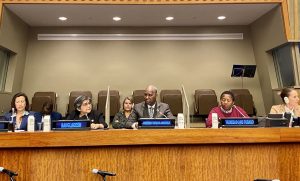– As delivered –
Statement by H.E. Tijjani Muhammad Bande, President of the 74th Session of the United Nations General Assembly
21 February 2020

Excellencies,
Distinguished Delegates,
Ladies and Gentlemen,
I am delighted to be here today to take part in the celebration of the International Mother Language Day, which has been observed every year since February 2000 to promote linguistic and cultural diversity and multilingualism.
As an important aspect of our respective cultures, mother languages proudly occupy a very prominent place. They are the first media that translate the meaning of the world and facilitate children’s understanding of their environment.
I thank the United Nations Economic, Scientific and Cultural Organization (UNESCO) for launching the global celebration in 2000. I also thank all member states of the General Assembly for resolving, through successive GA Resolutions, to promote, preserve and protect all languages across the globe, including those facing extinction.
In the same manner, I thank the distinguished Permanent Representative of Bangladesh for providing the leadership that has climaxed with today’s celebration. I would urge that we continue to promote mother languages as part of our work to achieve the Sustainable Development Goals.
Excellencies,
Quality Education and Inclusion are some of my priorities for the 74th Session. While quality education is critical to the realization of the Sustainable Development Goals, inclusion lays emphasis on those aspects of human development that are fundamental to fostering unity in diversity, collaboration, understanding and partnership. The recognition and promotion of mother languages gives minority language speakers greater sense of belonging.
Excellencies,
At the beginning of this Decade of Action and Delivery for Sustainable Development, promoting linguistic and cultural diversity contributes to our overall delivery of the 2030 Agenda for sustainable development, and ensuring that no one is left behind.
The theme for this year’s commemoration, the promotion of cross border and shared languages, has further reinforced obligations to promote multilateralism as the basis for fostering solidarity based on understanding, tolerance and dialogue.
Globalization has become an integral aspect of our present-day reality. With increased migration, promoting mother languages helps to create positive intercultural impact and enhance economic development, especially as people are connected though common heritage and resonating a distinct unity of purpose.
This also highlights the importance of fraternity of languages and cultures in building more peaceful, tolerant, and inclusive societies. Indeed, absent multilingualism, there will be little left for meaningful multilateralism.
Considering this declining pocket of cultures on the verge of extinction, I am of the view that the global community must redouble its efforts to promote mother languages. Recent researches have pointed to the declining usage of many mother languages, particularly as people adopt more widely spoken languages around the regions they find themselves. This is accentuated by the growing trends of digitalization and internet, as well as influence of social media.
We need to rededicate and recommit to the teachings of mother languages in schools in order to address the suppression of cultural identities and heritage. We have technologies that can help us revive and even develop languages. We should deploy them to those ends.
I am glad to say that in this respect, the UN has clearly provided the lead by underscoring in 2018 that linguistic diversity and multilingualism are a must for sustainable development at this time when many languages are dying at an alarming rate.
We need to rededicate and recommit to the teachings of mother languages in schools in order to address the suppression of cultural identities and heritage. We have technologies that can help us revive and even develop languages. We should deploy them to those ends.
Excellencies,
Ladies and Gentlemen,
I leave you with a quote from the renowned United States linguist, Anthony Aristar who remarked that:
“…. A language is not just words or grammar, it is a web of history that binds people together, all the knowledge they imparted to their descendants …. and when a language dies, it is the same as when species dies”.
I urge you to take this instructive viewpoint as an inspiration to uphold and protect our mother languages from extinction.
I thank you.